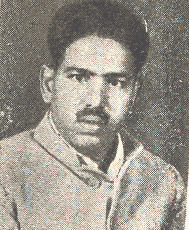
Sunkam Achalu (3 March 1924 – 9 August 1983) was an Indian politician. He represented Nalgonda in the Lok Sabha (lower house of the Parliament of India) 1952–1957.
Youth
Son of Kasayya, Sunkam Achalu was born in Nalgonda on 3 March 1924.[1] He didn't get a formal education, and worked as a farmer.[1] At home he managed to learn how to read and write in Urdu, Telugu, and obtained basic English skills.[2] In 1946 he married Ligamma.[1] He lived in Battuguda in Nalgonda town.[3]
Social work and political struggles
Sunkam Achalu led a long struggle for the upliftment of Scheduled Castes. He became a worker of the Indian National Congress at a young age. He left the Congress Party and became a leader of the Scheduled Castes Federation.[2] Between 1948 and 1950 he served as the President of the Nalgonda District branch of the Scheduled Castes Federation. He was also a member of the Working Committee of the Hyderabad Scheduled Castes Federation.[1]
1952 election
However, ahead of the 1952 Indian general election he was denied a SCF ticket to run for the Lok Sabha. Instead he ran as a candidate for People's Democratic Front for the Scheduled Castes-reserved seat of Nalgonda constituency.[1][4] He was the running mate of Ravi Narayana Reddy.[2] Sunkam Achalu won the seat, with the highest margin recorded throughout the country.[1][4] He obtained 282,117 votes.[5] His SCF opponent forfeited his deposit. Aged 27, Sunkam Achalu was one of the youngest Members of Parliament at the time.[2]
Whilst not a party member, Sunkam Achalu sat in the Communist Party of India parliamentary group in the Lok Sabha. He sought to influence the party to prioritize upliftment of Scheduled Castes.[2]
Death
References
- 1 2 3 4 5 6 Lok Sabha. Members Bioprofile: ACHALU, SHRI SUNKAM
- 1 2 3 4 5 Hari Sharan Chhabra (1952). Opposition in the Parliament: a unique, authentic and comprehensive biographical dictionary of M. P.'s on opposition benches. New Publishers. p. 40.
- ↑ Subodh Chandra Sarkar (1952). Indian Parliament and state legislatures: being the supplement to Hindustan year book, 1952. M.C. Sarkar. p. 120.
- 1 2 Gail Omvedt (30 January 1994). Dalits and the Democratic Revolution: Dr Ambedkar and the Dalit Movement in Colonial India. SAGE Publications. p. 273. ISBN 978-81-321-1983-8.
- ↑ Election Commission of India. STATISTICAL REPORT ON GENERAL ELECTIONS, 1951 TO THE FIRST LOK SABHA - VOLUME I (NATIONAL AND STATE ABSTRACTS & DETAILED RESULTS)
- ↑ Lok Sabha Debates. Lok Sabha Secretariat. 1983. p. 1.
- ↑ The Journal of Parliamentary Information. Lok Sabha Secretariat. 1983. p. 355.